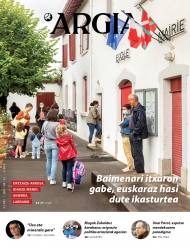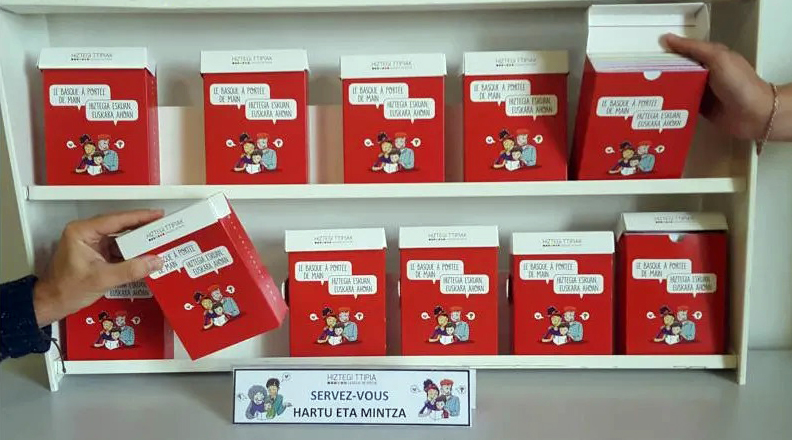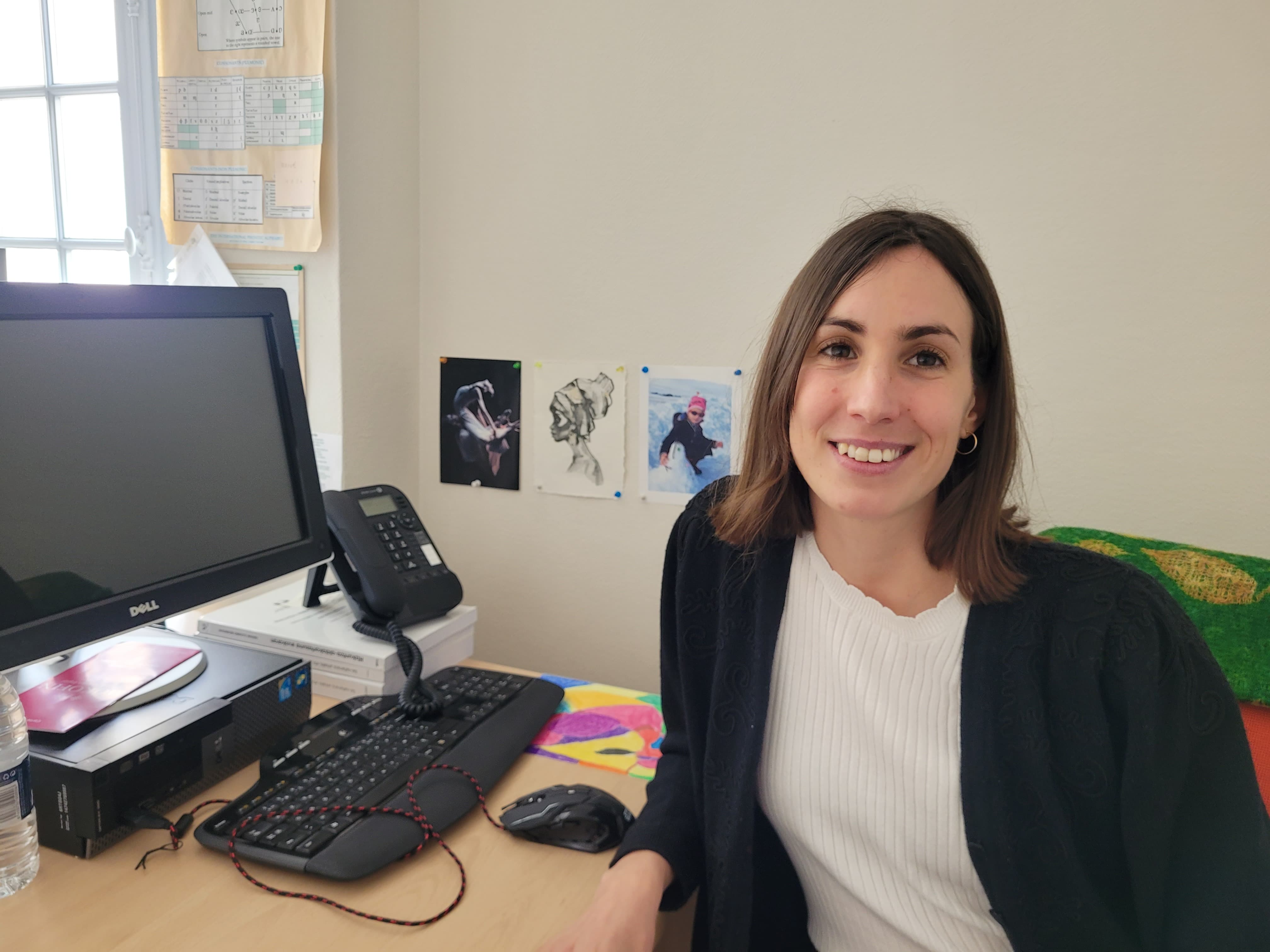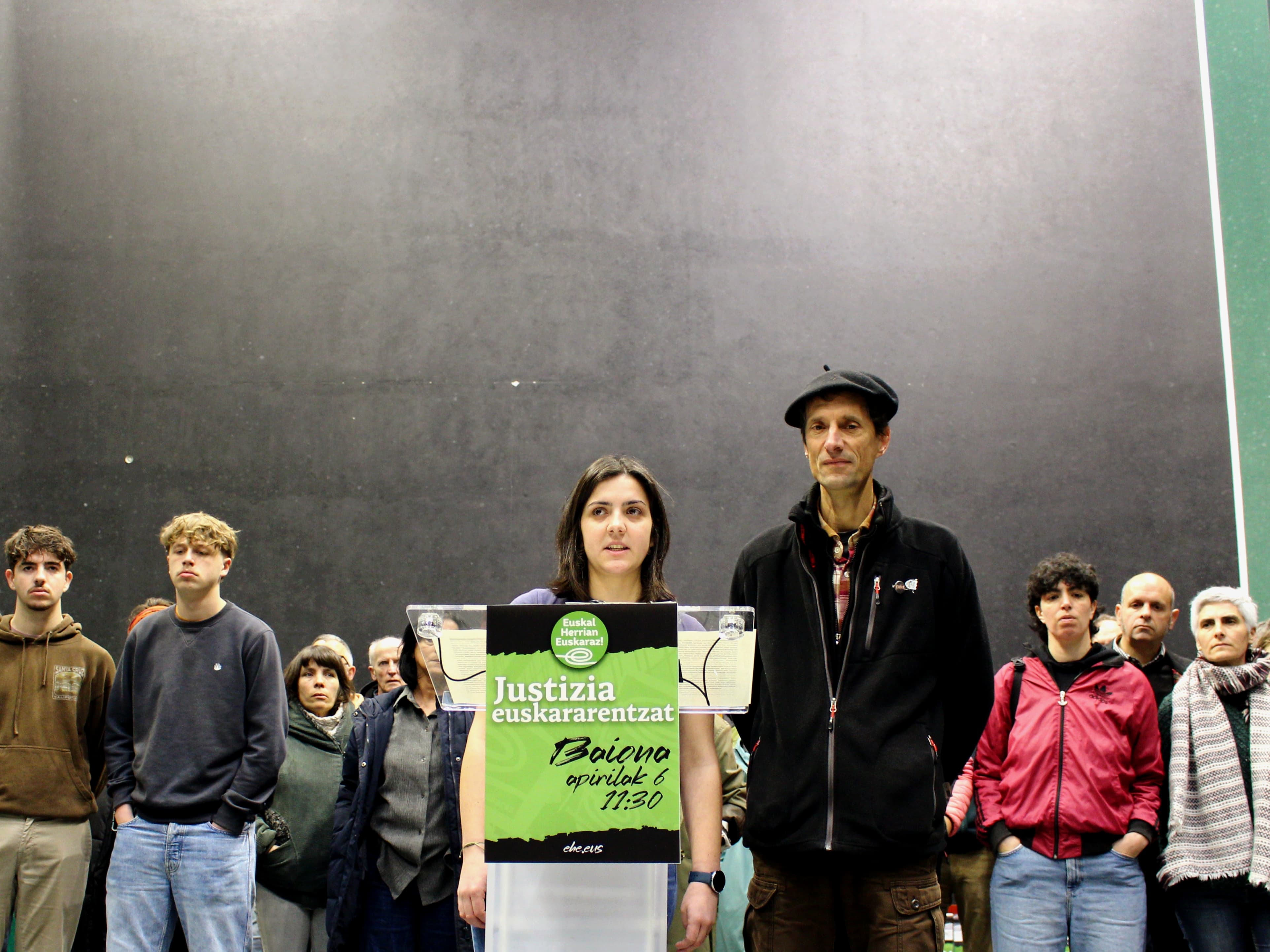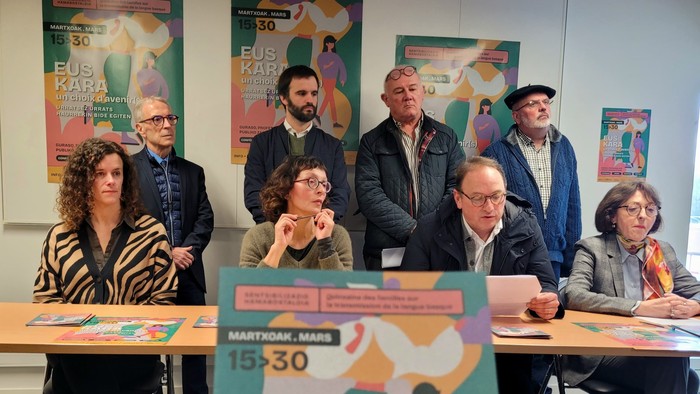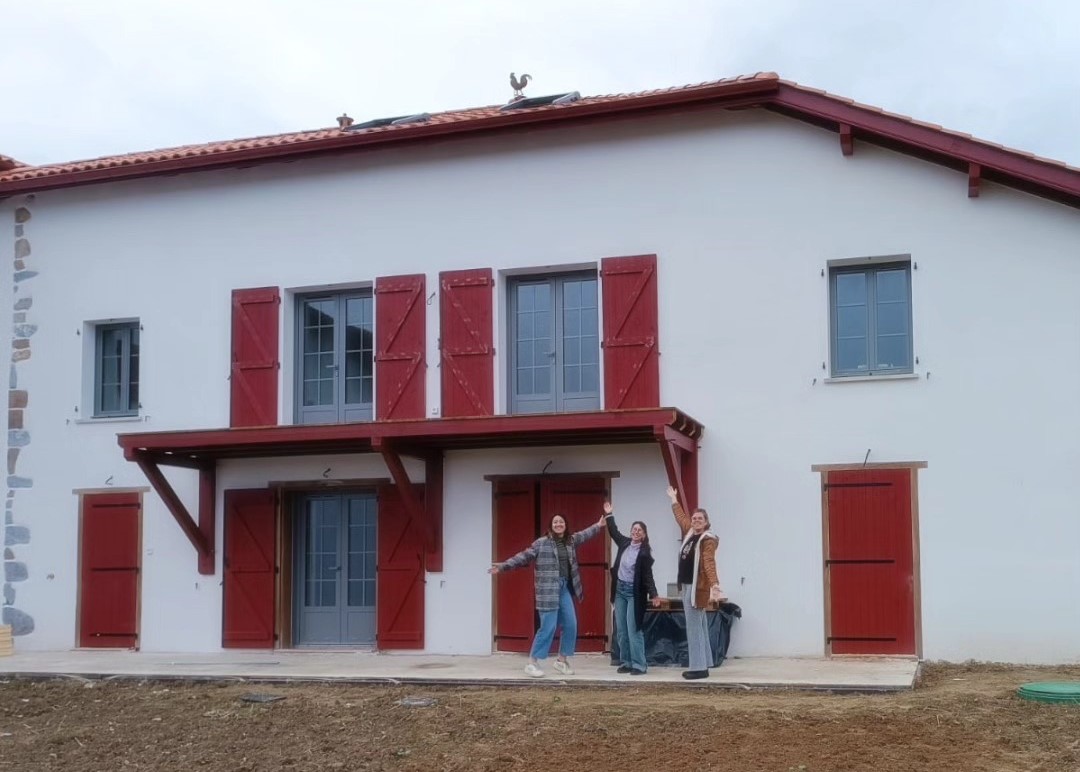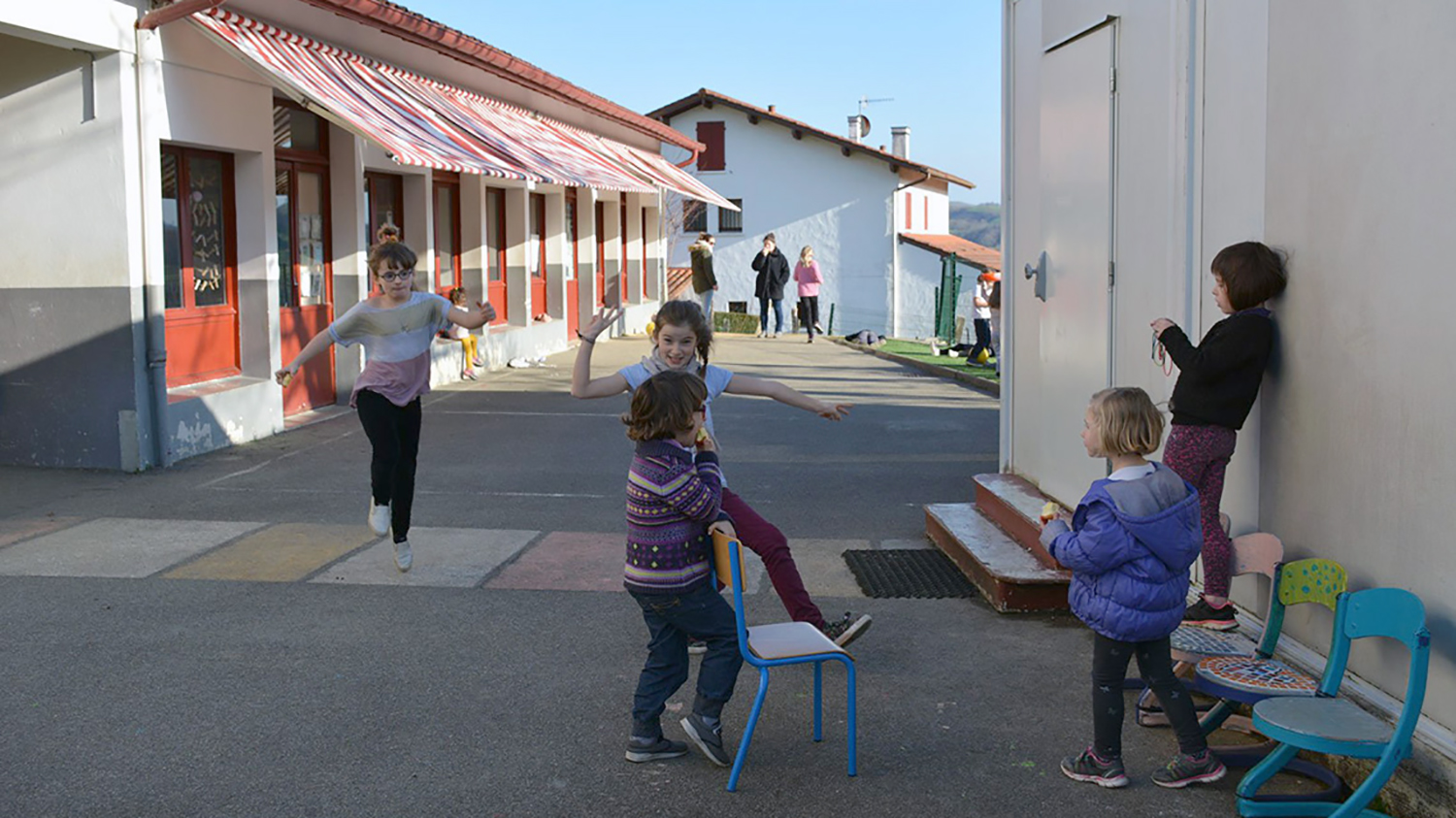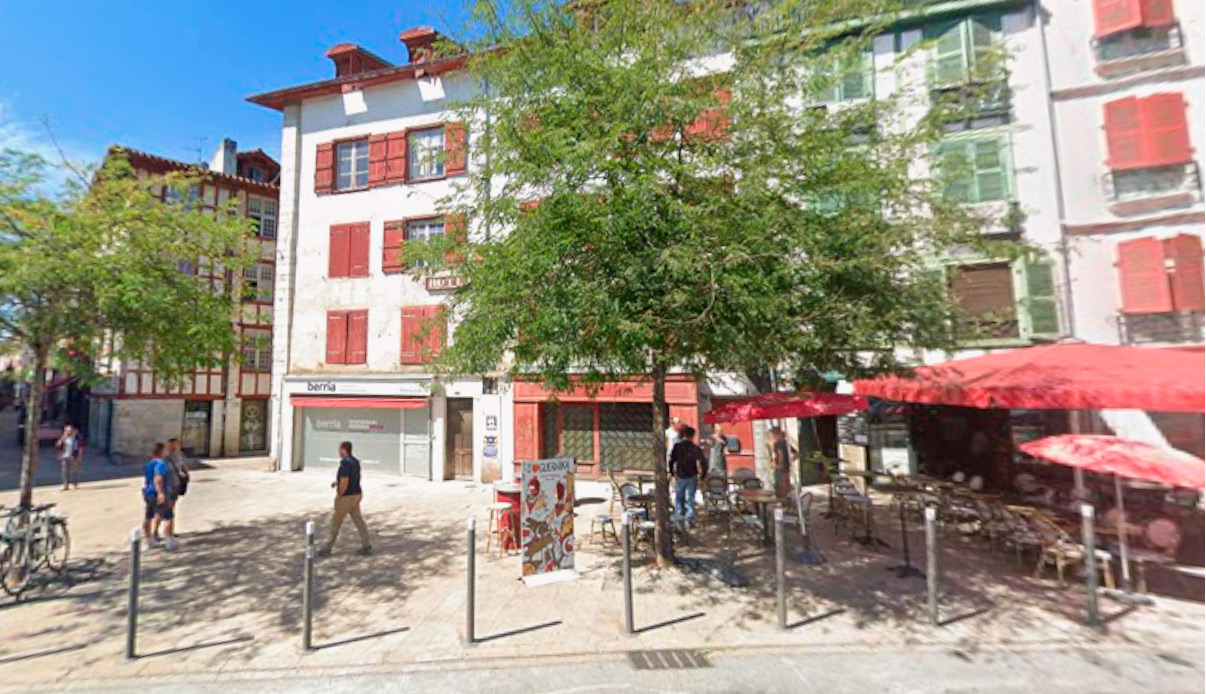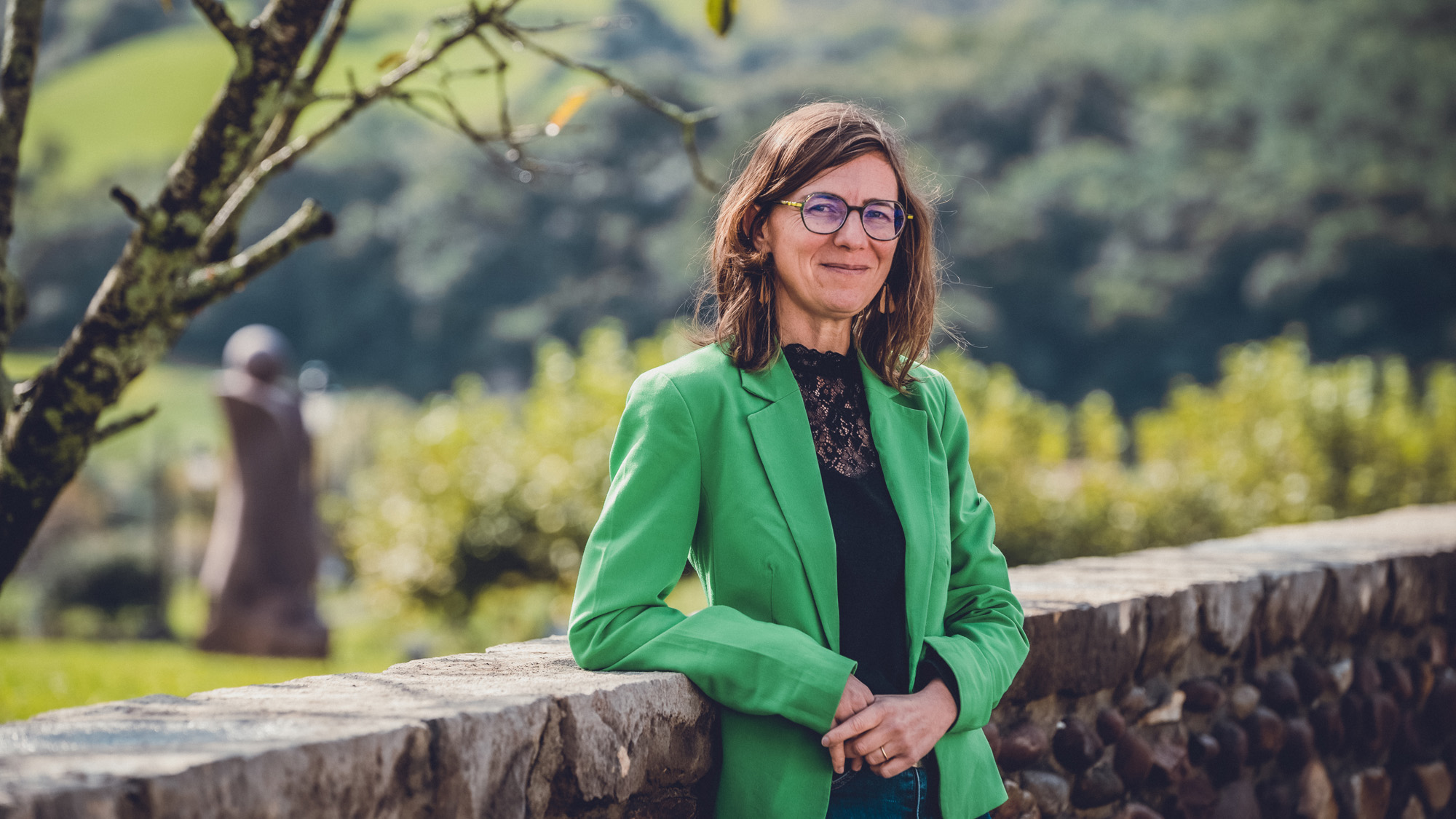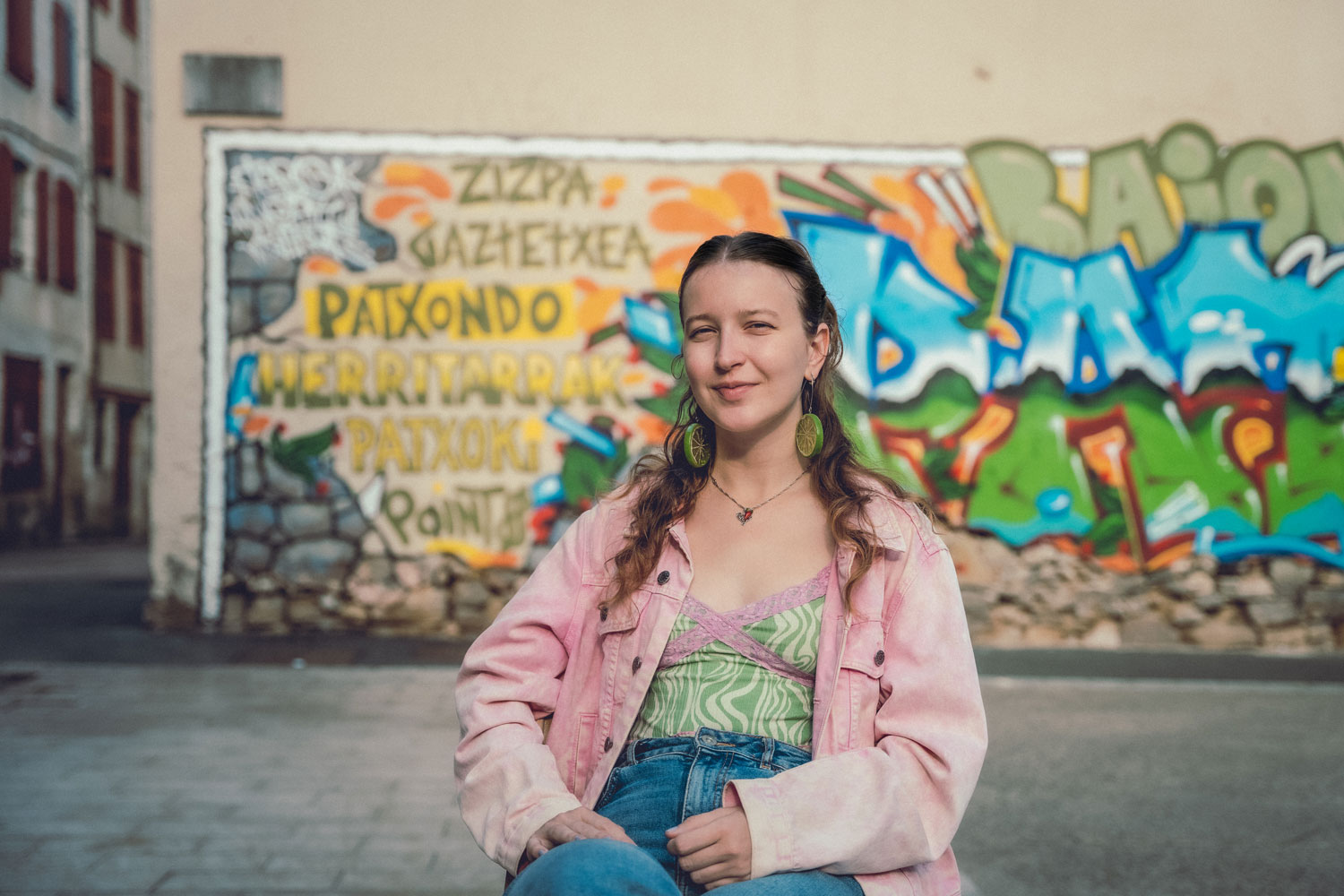They start a model of immersion without the official authorization of the Ministry of Education
- The maternal schools in Aiherra, Arrosa-Ortzaize, Idauze-Mendi and Larraine have started the course in Basque, although they did not have the official response of the rectorado. The weekend after the school's entrance, they discover that in the end they will have almost everything they have been asked for. The case of Larraine is unclear. To avoid punishment, a former teacher starts teaching there: “The people will materialize their model of immersion with their own resources.” The model of immersion in Basque has been achieved after a long struggle.
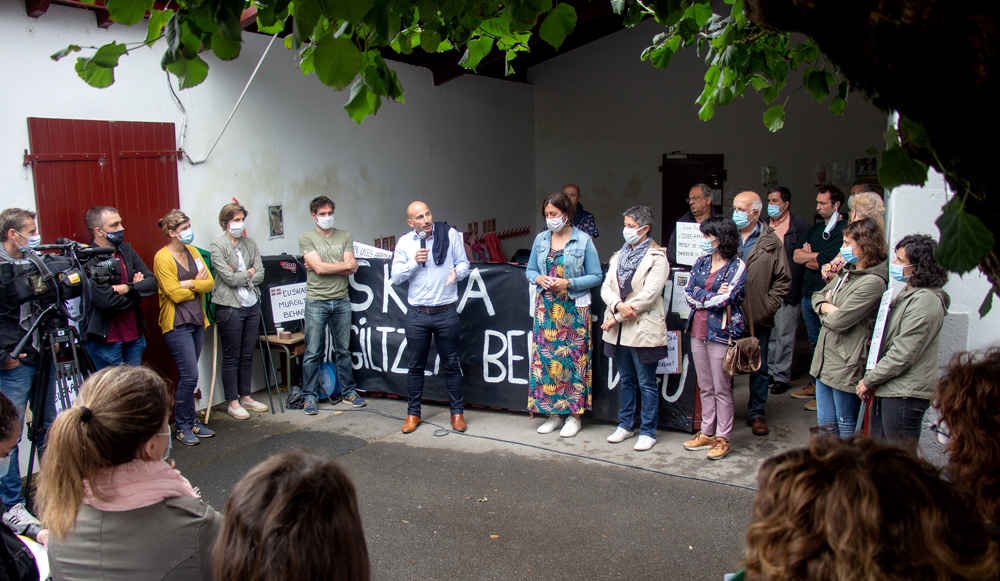
It's September 2, Thursday morning, and children from Euskal North Herria have access to school. Access for the first time has been made entirely in Basque in the Mother Schools of Ortzaiz, Larrain, Idauze-Mendi and Aiherra, although it does not have official authorization. The banderola “Complaining at school, we need to dive” is still connected to the entrance to Ortzaiz school. The bag on the back, the children have passed past the altar, and that is where they have the responsibility to receive in Euskera at the door of the class. As a reception, you will also take the course in Basque. In total, 29 children this year are the three years of the Ortzaiz school and 94.5% of their parents defend the model of immersion in Basque. In addition to parents, they are also teachers and elected officials of the locality. That is why, at the beginning of the year, the opening of an immersion model was requested by letter to the rectorate. Similarly, public schools in Larraine and Idauze-Mendi and the private school in Aiherra operated.
But they have reached the course of 2021-2022, without receiving a response from the French Ministry of Education. “We don’t understand why we’ve had to fight for a whole year: our demand is legitimate and natural,” says Mother Ortzaiztarra Floriane Changala.La Council meeting of the Department of National Education (CDEN) is set for
September 6 and then they should know if they are officially allowed the immersion model. The weekend following the school entrance, however, they learned that they will be approved a model of immersion for the first three years of Aiherra and Idauze-Mendi and for the first two years of Ortzaiz, perhaps for the third year. Larrain remains unanswered, but nevertheless, Antton Kurrutxarri, president of the Public Entity of the Basque Country, has been able to know from the rectorado that there are no technical, pedagogical and resource problems.
Thus pass the incursions into school in France, where the beautiful values of Liberté, Egalité, Fraternité are constantly repeated and in the territories of the minority languages that depend on it. Seen from Paris, the French Constitution and the first sentence of its second article are more important than the following three words: “The language of the Republic is French.”
“It is increasingly difficult to achieve a model of immersion. Last year the battle was brought to the Capital, this year for the other four peoples. But the most worrying thing about this period is that we have questioned the entire model of immersion,” says rebel Jean-Marc Ocafrain, who approached school on the first day of admission. “The decisions are made in Paris or far above, they are not decided here by representatives of National Education,” says the president of the association Marie-Andrée Ouret Biga Bai. This explains the need to start the course without an answer.
Yes or no, the neighbours of Arrosa, Aiherra, Altzürükü, Idauze-Mendi, Larraine, Mendikota, Ozaze, Ortzaize and Zalgizeko (towns linked to these four schools) announced that the courses of the maternal school will be offered in Basque, in a letter sent to the rector on 20 August: “Awaiting your answer, we inform you that we have chosen to guide the teaching measures in Basque to the children of the mother schools of our schools throughout the time and from 2 September.”
The French Ministry of Education already knew it and yet it has not responded directly and officially. “We were told that they responded to us at the time of truth, but we are September 2, it’s the day of entry and we have no answer,” says Ocafrain surprised.
The document sent to the media on the eve of the press conference on 31 August may reflect the pressure of the French Ministry of Education. They were aware of the initial decision on this issue: they only accept the model of immersion for the first year of the maternal school and this for the schools of Ortzaize, Aiherra and Idauze-Mendi. Thanks to the fight, they have finally achieved almost everything they wanted.
In Larrain, professor with toilets
At the moment, however, Larrain has not been admitted, since it is a standard school, because it has a single class that brings together all levels and probably, according to the Ministry of Education, under these conditions the teaching of French is not being taught. Officially it does not give that reason, stating that this request implies “specific questions”, it can be read in the letter sent by the rectorado to the media that needs a “deeper analysis”. For Kurrutxarri the “problem is political”, seeing that the latest news received from the rectorado say that there is no problem. They should have an official response in the coming weeks.
In order not to translate the law against the professor, in Larrain the way has been devised to start the imagination and offer the classes in Basque: a former professor of retirement has begun to take the course in Basque. Let the schools devote to the rectorship, even if the pressure is high, because what goes from rectorship to schools is exactly the same. The president of Biga Bai answers the question of whether teachers receive threats: “He may have threatened them... his head is the National Educational Organization and he runs the risk of sanctions being processed. That’s why we’ve taken someone from outside, because in theory the National Education Institution does not influence.”
Among the four schools and associations that carry out this struggle, they decided this path of resistance. “If we didn’t get permission from National Education, we had the idea of opening the department with our resources, making the model of immersion of the peoples with their own resources come true,” Ouret said. The people have responded and a toilet in Basabürüa has joined in teaching. If sokatira persists for a long time, they have two others willing to help her. “This help is often thankful, and people are willing to give it in one hand,” says the father of the era Aines Accoceberry. Beyond the Basque Country, it is clear that the French National Educational Institution does not want a model of immersion, but if this type of school were not a government it would be better. “The National Institute of Education will do whatever it takes to weaken our school.” There are thirteen boys and girls at Larraine Public School. The ttipi school, therefore, but essential for the emptying Zuberoa.
In addition to ikastolas, 39 schools
The demand for the development of immersion in the public and private spheres is not new. In addition to the ikastolas, in Lapurdi, Nafarroa Beherea and Zuberoa there are schools that target the model of immersion in Euskera, which brings together twenty public and nineteen private schools, regardless of the four opened this year, and in total, about 1,100 students. In addition to the 3,900 students from the Seaska network, the immersion model represents 10.7% of the students from the Northern Basque Country.
The first was opened in 1997 at the private school of Sainte-Marie de Azkain, almost all the time for the first two years of the maternal school, and in 1999 all the time at the private school of Saint-Vincent de Uztaritz. As for the public section, they began in 2008 in Azkain and Donibane Garazi. Since then, the offer has been developed because the Public Institution of the Basque Country, created in 2004, placed the development of the immersion model as strategic, and over the last decade the bilingual associations Biga Bai, Ikas Bi and Euskal Haziak have communicated more about immersion. “Since its inception, the immersion departments have been opened within the framework of the law, in collaboration with the Ministry of Education,” warns Ouret. The educational legislation offers them the possibility to experience other ways and has been used to offer the model of immersion in Basque in public and Catholic schools.
But in recent years, there has been a change: “It feels like the National Educational Organization doesn’t want to see more immersion models. The last protocol to channel the openings is hard, making it very difficult to open the dive department.” It refers to the protocol presented at the end of last year, which basically rejected the vote also by the Public Entity of the Basque Country. It places the change of tone in the context of the achievement of the immersion model and the Molac Law, a development that the French National Education Society intends to curb.
From Molac to Constitutional Council Resolution
The judgment of the French Constitutional Council of 21 May gives rise to great concern and uncertainty: “In accordance with Article 2 of the Constitution, the Constitutional Council recalls that the use of French is forced upon moral persons in public law and persons in private law who carry out a public service mission. The right to use a language other than French in administrative relations and in public services does not prevail over private individuals, and they cannot be obliged to do so”.
This Resolution soon met the expectations created by the Molac Law. We recall that on 8 April the French Parliament voted in favour of this law, with 247 Members in favour and 76 against. It was a historic vote, because the Jacobinisms in the French Parliament are rare in the position in favour of local languages. Following this vote, Breton Rep. Paul Molac, the basis of the law, said to ARGIA: “[Deputies] vote in favour of their territory, in favour of local languages and against the State machine. They have become superior.” The vote was the result of the work of chinaurri carried out by associations and elected officials defending minority languages. This text included the possibility of offering a model of immersion in the public school in the local language. But at two weeks, about 60 Members appealed to the French Constitutional Council. “There are no minority languages in the territories of the Members of Parliament, but they do not want to give rights to others,” Molac himself said in his clear complaint that day. The Constitutional Council issued a resolution in which the model of immersion not in French is opposed to the Constitution.
Since then, concern, complaint and ignorance have prevailed among the agents who bet on local languages, as well as among the politicians who position themselves in favour of them, as is the case of Jean-Rene Etxegarai, president of the Basque School of Urban Helmets, who denounces the “declaration of war” on 21 May. The concern is even greater because the future of contractual schools such as ikastolas is being questioned. Because, if we take the resolution literally, its action also goes against the constitution, which in the interview linked to this report Eneritz Zabaleta explains in detail what is at stake. On 29 May 10,000 people met in Baiona to denounce the resolution and thousands more in protests from other territories with a local language.
In order to reassure the margins, on 18 June the Constitutional Council published the note specifying that the resolution only served public schools, but soon afterwards rebutted the determination by a note... Things are not clear, but what is clear is that the ruling that considers immersion to be unconstitutional is there. In this respect, the request for an amendment to the French Constitution has taken place. Proof of this is the letter sent on 15 June by 140 Members to President Emmanuel Macron: “Only the revision of the Constitution provides a definitive guarantee of the promotion, protection and transmission of languages in our regions.”
The lawsuit is not over, and seeing that they are the two sides, it will take a long time for the sokatira to arrive.
Tokiko hizkuntzetan bideraturiko murgiltze eredua eskola publiko eta pribatuetan eskaintzeko eskubide historikoa ezeztatu zuen Frantziako Konstituzio Kontseiluak maiatzaren 21ean, garaipen hau zekarren Molac Legearen bozketatik 44 egunetara. Ebazpen horrek dakarrena xeheki azaldu digu Eneritz Zabaletak, nola ez, murgiltze eredua bermatu eta garatu ahal izateko bideetan arreta jarriz.
Murgiltze eredua tokiko hizkuntzetan eskaintzea Konstituzioaren kontra doala ebatzi zuen maiatzean Konstituzio Kontseiluak. Harritu zintuen epaiak?
Egia da beti ukan duen ildoa segitu zuela, baina hala ere gogorra iruditu zitzaidan. Harridura pixka bat eragin zidan, iraganean baino gogorragoa zelako. Jada 2001ean murgiltzeari buruzko epai bat atera zuen, zeinetan nolabait bereizten zituen eskola publikoak –hauentzat kontrakotasuna sendi zen– eta ikastola eta diwanen gisako hitzarmen bidezko eskolak –hauentzat baimentzen zuen–. Pentsatzen nuen aldi honetan ere horretan geldituko zela, ez zituela zalantzan emanen kontratu peko eskolak. Azkenean bai eta biziki gogorra iduritzen zait.
Alta, hortik egun batzuetara, Konstituzio Kontseiluak berak ohar bidez jakinarazi zuen bakarrik eskola publikoentzat balioko zuela epaiak. Ebazpena ala oharra, zeinek du balore juridikoa?
Erabakiak du balio. Konstituzio Kontseiluaren baitan kalapitak edo eztabaidak egon direla agertzen da, zeren ohar hori plazaratu eta egun batzuetara berriro aldatu zuten oharra, gibelera eginez, zerbitzu publikoa bere osotasunean kontuan hartzen zela erranez –ez bakarrik eskola publikoak–. Geroztik jakin dugu kontseilari batzuk ez zutela bortxaz gaia ezagutzen, eta beste batzuek baliatu zutela aukera lekuko hizkuntzetan bideratu murgiltzearen kontra joateko.
Ebazpenak ondorioak ukan ditzake kontratu peko eskolen diruztatze publikoan?
Funtzionamendu gastuak estaltzeko herriko etxeek diru bat banatu behar dute eta horrek balio du ere herriko umea ondoko herriko eskolara baldin badoa. Praktikan, betebehar hau ez da beti betetzen. Zer gertatuko da? Kontratu horiek mantentzen diren heinean ordaindu beharko dute, legeak hori dioelako. Baina galdera da: Zer gertatuko da kontratu horiekin? Ez ote du ministerioak noizbait galdeginen kontratuekin segitu ahal izateko murgiltze eredua aldatzea? Ziurgabetasunean gara.
Murgiltze eredua eskola publikoan eskaini ahal izateko esperimentazio eskubidea erabili izan da. Mekanismo horren bukaera ere dakar Konstituzio Kontseiluaren epaiak?
Esperimentazio mekanismoa plantan eman ahal izateko baldintza bat jarri zuten: legearen kontra joatea esperimentatu daiteke (mekanismo berri bat esperimentatu, ondotik ikusteko ea lege bidez orokortzen den mekanismoa), baina ezin daiteke Konstituzioaren kontra doan zerbait esperimentatu. Orain arte murgiltzea esperimentatzen ahal zen, ez zelako argi eta garbi erraten Konstituzioaren kontra zioala. Baina orain badugu epai argi hau dioena Konstituzioaren 2. artikuluaren kontra doala eta eskola publikoetan ezin dela eredu hori aplikatu. Hor dago zalantza eta dagoen borrokan landutako bidea da erratea eskola publikoan esperimentatzen dena ez dela Konstituzio Kontseiluak definituriko murgiltze eredua. Dena dela, berriro ere ziurgabetasun handia bada: zer jarrera hartuko ote du errektoreak esperimentazio horiekin? Eskola sartze hau normalki iraganen dela erran dute, baina gerora begira galdera ikur handi bat bada. Zer gertatuko da etorkizunean? Errektoretzak zer erabakiko du?
Azkenean, iraganean garatu bideak moztu ditzakete.
Bai. Gainera Konstituzioko 62. artikuluak dio Konstituzio Kontseiluaren epaiak derrigorrez aplikatu behar dituztela autoritate publikoek. Horrek erran nahi du gauzak lehen bezala segitzen badira epai hori ez dutela betetzen eta momentu bat etorriko dela zeinetan erranen zaien epaia aplikatzea. Gaur egun diren eredu guztiak dira zalantzan ematen eta hor dago arriskua.
140 parlamentarik Konstituzioa aldatzea eskatu zuten ekainean. Teknikoki nola aldatzen da Konstituzioa?
Iniziatiba hau badugu bai eta horrez gain, uztailean bi parlamentarik ateratako txostena ere hor dugu. Azken honetan ere agertzen da Konstituzioa aldatu ezean ez dela aukera handirik. Macronen legegintzaldi honetan ez da eginen, hauteskundeak laster direlako. Egitekotan 2022tik aitzina eginen litzateke. Badira bi bide Konstituzioa aldatzeko. Bata, erreferendum bidez bukatzen dena, hau da, parlamentariek Legebiltzarrean eta Senatuan testu bera bozkatu ondoren erreferendum bidez berrestea –ez dut uste ikusiko dugunik egun batez hori–. Bestea da bide presidentziala, hor ere testu berdina bozkatu behar dute eta ondotik Frantziako lehendakariak erabakitzen du testua bide parlamentariora bideratzea, Kongresua deitu parlamentu berezira, Legebiltzarreko eta Senatuko kide guztiak ganbera berean biltzen dira eta bozketan %60ko gehiengoa behar da aldaketa lortzeko.
Uztailaren 21ean Kerlogot eta Euzet parlamentariek gobernuari aurkeztu txostena aipatu duzu. Zein da zure irakurketa?
Niri iduritzen zait oso txosten timidoa dela. Txosten honek alternatibak aurkeztu behar zituen, baina azkenean egiten duena da arazo juridikoa berretsi. Hainbat pista planteatzen ditu, baina beti zehaztuz juridikoki arriskutsuak direla. Hori horrela, Konstituzioaren aldaketa da juridikoki egoera konpontzeko bide bakarra, hori gabe beti ziurgabetasunean izango garelako.
Horrentzat nahikeria politikoa behar da eta hau ez dugu sendi.
Parlamentarien txostenean ere hori erraten da, ez dira baitezpada Konstituzioa aldatzearen alde, ez dira lekuko hizkuntzei buruzko eztabaidaren alde. Aldarria plaza publikoan jarri beharko da, hautagaiek engaiamenduak hartzeko gisan eta ondotik presidente izendatuak promesa betetzeko gisan. Tamalez badakigu promesak ez direla beti betetzen, Hizkuntza Gutxituen Europako Ituna berrestearen promesa bi aldiz egin izan da eta alta, ez da sekula egin.
Plaza publikoan egon da aldarria. Gero hurbil-ertainean ere horrela segituko duela uste duzu?
Hurrengo borroka hori izango dela uste dut. Ongi antolatu beharko da, Konstituzioa aldatzea galdegiten duen plataforma berezi bat osatu beharko da. Presidentzialak direnean beti egoten da lekuko hizkuntzei buruzko interpelazio lana, baina uste dut lan handiagoa egin beharko dela aldi honetan: lobby lana eginez, mobilizatuz eta hautagaien programetan engaiamendua sarraraziz. Hori izanen da oraingo borroka.
Europa izan daiteke hizkuntza gutxituen aitortza lortzeko bidea?
Juridikoki erran nezake ezetz. Hizkuntza politikarena ez da Europar Batasunaren eskumenetan eta nahiko askatasun handia uzten die estatuei hizkuntzen trataera arautzeko. Beraz hortik juridikoki ez dut bide handirik ikusten. Estrasburgoko Europako Giza Eskubideen Auzitegiaren pista ere aipatu da. Europako Kontseiluak sortu zuen organo hau baina honek ere askatasun handia uzten die estatuei hizkuntza eskubideen arloan, kontsideratzen duelako 1951n adosturiko Europako Giza Eskubideen Konbentzioak ez dituela hizkuntza eskubideak bere babespeko hartzen. Beraz nekez ikusten dut juridikoki Frantzia zigortzeko edo kondenatzeko bidea Europatik.
Hizkuntza Gutxituen Europako Ituna berretsia balitz, honek Konstituzio Kontseiluaren epaia baino balore handiagoa luke?
Kontua da itun hau berresteko Konstituzioa aldatu behar litzatekeela, epaileek diotelako itun honek sortzen dituela Konstituzioarekin bateragarriak ez diren eskubide batzuk. Azkenean arazo beraren aitzinean gara. Arazoa konstituzionala denez Konstituzioa aldatu beharko da, hori gabe gauden egoera zalantzatian edo are egoera okerragoan izanen garelako.
Errektoreak du lekuan leku eskaerei erantzuten. Jarrera jakobinoan dira, ala noiztenka lekuko hizkuntzen aldeko posturak ere ageri dira?
Errektoretza azkenean hierarkiaren printzipioari lotua da eta Hezkuntza Ministerioaren manuak aplikatu behar ditu. Jean-Michel Blanquer Hezkuntza ministro denetik, jarrera gogorrago batean daude errektoretzan eta inspekzioan. Hala ere, gaia ez bada puri-purian, agian askatasun eta aukera gehiago dauka errektoreak, baina hor gaia puri-purian izanki, saiatuko dira hautsi-mautsi bat lortzen, beti ere ministerioko printzipioak aplikatuz. Gobernutik eman den kontsigna da aurtengo eskola sartzea lehen bezala, hau da, deus hunki gabe bideratzea. Aurtengoa horrela pasako da, baina hemendik aitzina egoera zailduko da.
Euskal hizkuntzalaritza esperimentaleko katedra berria estreinatu dute Baionako fakultatean.
25 bat eragilek adierazi diete elkartasuna apirilaren 11n Baionako auzitegian epaituko dituzten Intza Gurrutxaga eta Gorka Torre Euskal Herrian Euskaraz taldeko kideei. Egun batzuk lehenago, apirilaren 6an Baionan eginen den manifestazioan parte hartzeko deia ere luzatu dute.
Plazara, AEK, Uda Leku, Dindaia eta Ebete antolakundeak Baionan elkartu dira Famili'on egonaldi ibiltariaren lehen edizioa aurkezteko. Hizkuntza mailaren arabera eskaintza bat edo beste egongo da eta haur zein gurasoentzat izango da udaberrian.
Hizkuntzarako ere gurasoak haurrentzako eredu direla kontuan hartuta, euskararen erabilera eta irakaskuntzari buruz sentsibilizatzeko helburua duen hamabostaldia antolatu dute Hendaia, Urruña, Donibane Lohizune eta Ziburuko herriek. Martxoaren 15etik 30era guraso... [+]
Nafarroa Beherean, Aiherrako 'Beltzegitea' etxean kokatuko da Eguzkilore haurtzain-etxe berria. Euskara, natura eta motrizitate librea oinarri harturik, heldu den apirilean hasiko dira zerbitzua eskaintzen.
The problem of the afrancession of the names of the places of Euskal Herria is not only due to the lack of consideration of the language in the signaling panels, but also to the execution of a decision on the domiciliation that was taken a few years ago.
Ultimately, the... [+]
Larunbatean ospatu dituzte Ttinka mikro haurtzaindegiaren bost urteak Lakarran. Baxe Nafarroko euskara hutsezko egitura bakarra da, Euskararen Erakunde Publikoaren B ziurtagiriduna.
On May 17, five Euskaltzales of Ipar and Hego Euskal Herria performed an action coinciding with the call made by the students of the Bernat Etxepare lyceum to mobilize in favor of the Basque. On the wall of the Baiona Subprefecture, a message was sent to the authorities of the... [+]









